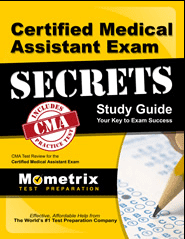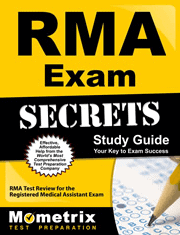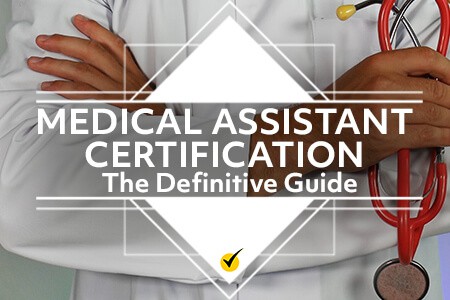Working in the medical field can be a rewarding career. Not only are there different areas and specializations you can work in, but you also have the chance to help people on a daily basis.
Medical Assistants can be found working in a variety of settings and are needed in all types of medical facilities. The role of a medical assistant can also vary such as doing administrative duties one day and clinical duties the next. But no matter where you work as a medical assistant or what you do, medical assistants are always needed and play an important role in the medical facility.
Just as the medical field has different opportunities, there are different ways that you become a Certified Medical Assistant.
CMA Certification Exam
The CMA Certification is offered by the Certifying Board of the American Association of Medical Assistants (AAMA). It is the only medical assisting certification that requires the candidate to have graduated from an accredited postsecondary medical assisting program.
Those who have graduated from a postsecondary medical assisting program have received training in administrative and clinical settings in a variety of areas such as medical terminology, office practices, and first aid. Students are also required to complete unpaid on-the-job training in a healthcare setting.

The exam consists of 200 multiple-choice questions that are divided up into four 40-minute segments. On the CMA Certification exam, you will be asked questions over areas such as human growth and development, interpersonal skills, and the medical assistant scope of practice.

To be eligible to sit for the exam, you must:
• be a completing student or a recent graduate of an accredited program
• be a nonrecent graduate of an accredited program (candidates who apply for the certification exam more than 12 months after graduation)
• be a CMA (AAMA) recertificant
Certified Medical Assistant Practice Test
CMA Course
RMA Certification
The Registered Medical Assistant Certification is a credential through American Medical Technologists (AMT). The AMT does not require a candidate to have graduated from a postsecondary medical assistant program; however, you are required to pay an annual fee to maintain your credential. The RMA Certification exam is a competency-based exam which means that you should already have working knowledge and skills that are required for the job role.

The test consists of 200 to 210 multiple-choice questions that take three hours to complete. You will be tested over your knowledge and skills in body systems such as anatomy and physiology, medical terminology and administrative medical assisting such as insurance claims and bookkeeping.
To be considered eligible to sit for the RMA, you must meet one of the eligibility requirements:
- be a recent graduate or are scheduled to graduate from an accredited medical assisting program or a medical assisting program that is within an accredited institution. If the candidate is graduating from the latter, the program must 720 clock-hours of training which includes 160 hours of clinical externship. The applicant must have also graduated from their program within the past four years or provide relevant work experience for at least three of the last five years.
- be a recent graduate or scheduled to graduate from a medical services training program of the U.S. Armed Forces.
- have been employed as a medical assistant for at least five out of the last seven years. Your work experience must include both administrative and clinical duties. You are also required to show proof of high school graduation.
- be currently instructing in an accredited medical assisting program, have completed a course of instruction in a healthcare discipline related to medical assisting, have a minimum of five years of full-time teaching experience in a medical assisting discipline.
CMAA Exam
The CMAA exam is a certification giving candidates the credential to become a Medical Administrative Assistant given by the National Healthcareer Association. This credential shows that you are able to perform administrative tasks in an office or clinic. You are not required to have the CMAA certification to become a Medical Administrative Assistant, but it looks better on your resume and it shows that you have the training that employers are looking for.
On the CMAA exam, there are 150 scored questions with 30 pretest questions that do not count towards your final score. You are given 3 hours to complete the exam. You will be tested over your knowledge of scheduling such as determining the scheduling needs of the facility, how to verify insurance, and following OSHA and HIPAA guidelines.
To be considered eligible to take the exam, you must:
• have a high school diploma or GED
• complete a training program in the health field covered by the NHA certification exam
• completed a Registered Apprenticeship Program that is in the health field covered by the NHA certification exam AND registered with the U.S. Department of Labor fulfills the training program
• have formal medical services training in the health field that is covered by the NHA certification exam in any branch of the military
OR
• have at least one year supervised work experience in the health field that is covered by the NHA certification exam within the past three years
You should also be able to provide documentation of:
• CPT certification proving that you have performed at least 30 venipunctures and 10 capillary sticks
• CET certification proving that you have performed at least 10 EKGs
NCMA Exam
The NCMA exam, or the National Certification Medical Association exam, is a certification exam from the National Center for Competency Testing. The NCMA exam tests candidates on their knowledge of medical office management and medical assisting. You are not required to have the NCMA certification, but many employers do require certification.
The exam contains 150 scored questions and 15 unscored questions that need to be completed within 3 hours. You will be tested on your knowledge over medical procedures such as patient care and phlebotomy as well as general office procedures such as medical office computer applications.
There are several eligibility requirements to be able to sit for the NCMA test:
• Be a current student in a medical assistant program from an NCCT school
• Be a graduate from an NCCT authorized medical assistant program and submit a copy of your diploma, certificate of completion or transcript
• Have two years of full-time experience as a medical assistant within the past five years or 4160 hours, and submit a copy of your high school diploma and Medical Assistant Certification Qualification by Experience form
OR
• Have completed medical assistant training while in the US Military within the past 5 years
CCMA Exam
The CCMA exam or the Certified Clinical Medical Assistant exam is a certificate from the National Healthcareer Association. The CCMA certification allows medical assistants to not only perform administrative duties but allows them to perform more clinical duties.
The CCMA contains 150 scored questions and 30 unscored pretest questions. You are given 3 hours to complete the CCMA exam. You will be given questions to test your knowledge over medical terminology and basic pharmacology as well as clinical patient care.
To be eligible to sit for the exam, you must:
• have a high school diploma or GED
• complete a training program in the health field covered by the NHA certification exam
• completed a Registered Apprenticeship Program that is in the health field covered by the NHA certification exam AND registered with the U.S. Department of Labor fulfills the training program
• have formal medical services training in the health field that is covered by the NHA certification exam in any branch of the military
OR
• have at least one year supervised work experience in the health field that is covered by the NHA certification exam within the past three years
You should also be able to provide documentation of:
• CPT certification proving that you have performed at least 30 venipunctures and 10 capillary sticks
• CET certification proving that you have performed at least 10 EKGs


